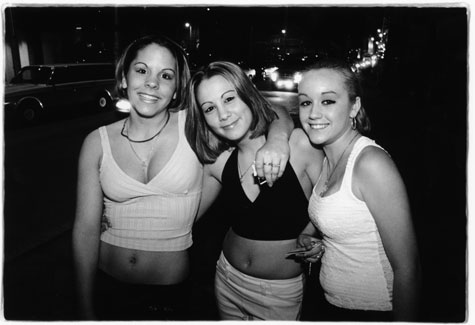
IS THE PARTY OVER? Some young revelers. |
Seasoned partiers will recall that about a decade ago our august legislature considered barring anyone under age 21 from Rhode Island night clubs in a bid to curb underage drinking.
The impresarios cried foul: the 18- to 20-year-old set is an important source of revenue, they argued, and a ban threatened to bring down the curtain on Providence night life.
Lawmakers, in a rare display of equanimity, landed on a compromise — requiring clubs to identify those of legal drinking age with hand stamps and bracelets and forbidding patrons from buying more than one drink at a time in the hope that they would pass fewer Pabsts on to little cousin Ricky.
But lately, the capital city has acquired a reputation as a hard partier’s paradise — a reality that owes something to a wide-ranging under-21 ban in Boston. And there has been some violence, mostly notably at Jewelry District haunts Club Elements and Level II.
State Representative Joy Hearn, a Barrington Democrat whose home town has seen more than its share of high-profile underage drinking tragedies, has revived that decade-old push for a ban. She says she wants a “safe city that encourages a good night life without having to rely on underage drinking to support that.”
But is an all-out ban called for? Providence City Hall, busy cultivating the “Creative Capital” brand, thinks not.
“We feel very, very strongly that banning under 21 is not the way to go,” says Lynne McCormack, director of Providence’s department of art, culture, and tourism. “We want people to go to Lupo’s and listen to live music. We want people to go to AS220 and listen to live music.”
Rich Lupo, owner of Lupo’s Heartbreak Hotel in downtown Providence, says an all-out ban would be a too-blunt instrument. “I think that many clubs have proven that they’re able to run their establishments properly,” he says. “Should all be punished because of the transgressions of the few?”
There is talk of carving out an exception for live music. The idea: young people who go out to see a band are primarily interested in the entertainment, not the booze. But as one Providence pol points out, traditional conceptions of “live music” are outdated.
“The live band-versus-DJ binary is no longer relevant at all,” says Representative David Segal, who at 30 is a touch closer to the dance floor than his gray-haired colleagues.
Indeed, with the laptop challenging the guitar as the signature instrument of 21st Century pop, drawing the line between live and other forms of music would be a tricky en-deavor. And that line, if sloppily sketched, could exclude a major art form: electronica.
“A lot of young people now — they’re raised on electronic music,” says Micah Salkind, a graduate student at Brown University who is one half of the DJ duo Micah Jackson. “They don’t imagine going out to see a rock band.”
Electronica is part of a larger music scene that helps define Providence as a cultural center, Salkind argues. And taking in that scene helps the under-21 college crowd picture a post-graduation life here as a musician or an artist, he says — no small thing in a city that so often laments the departure of the young and talented.
With all that in mind, Segal is pushing a compromise bill that has the support of the city and the Providence Nightlife Association, which represents night clubs. Rather than impose a blanket ban, the measure would allow local licensing boards to bar the admittance of patrons under 21 at clubs found responsible for underage drinking, criminal of-fenses, or disorderly conduct upon the premises.
Alex Tomasso, president of the nightlife association and owner of several clubs, says the only thing missing from the bill is some clarity on how many violations a club would have to amass before it could lose its under-21 privileges. He suggests three.
But if cutting down on late-night rowdiness is the central concern, the most promising initiative may already be in the works. In the coming months, Providence officials hope to roll out a pilot program that would allow for staggered closing times at the clubs. The goal: preventing thousands of the young and wasted from spilling out onto the streets at the same time.
The program is based on an effort out of San Jose, California, that has met with mixed success, McCormack says. And there are implementation details still to be worked out. But with talk of an under-21 ban in the air for the second time in a decade, one thing is clear: there are alternatives.